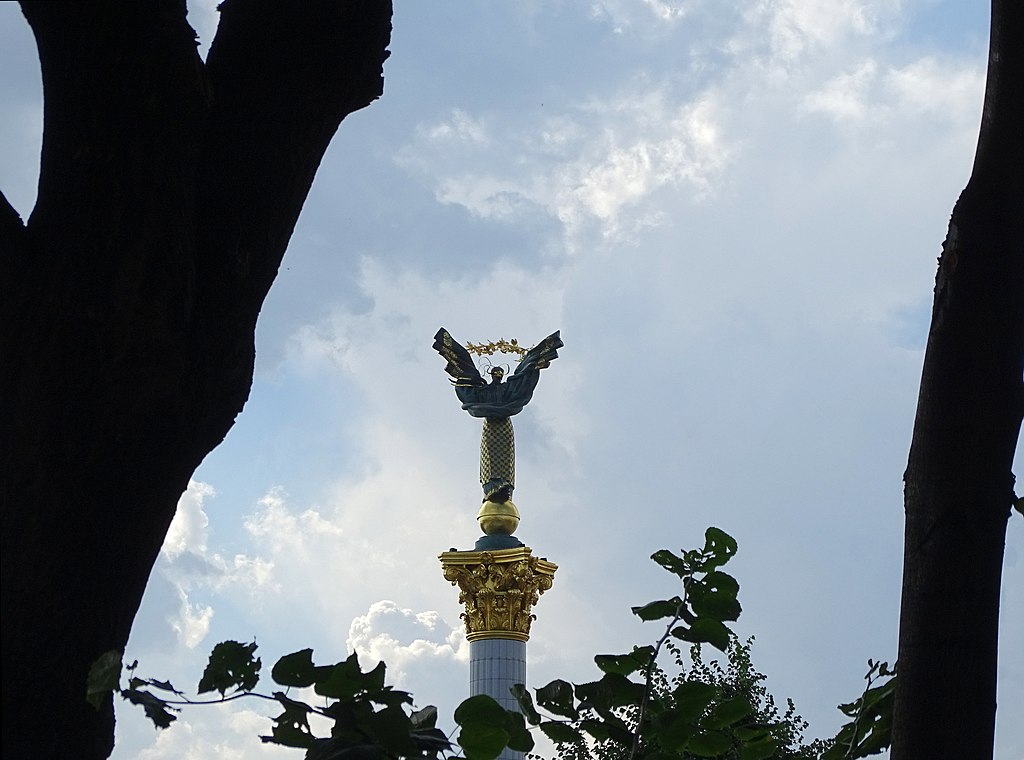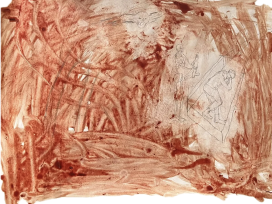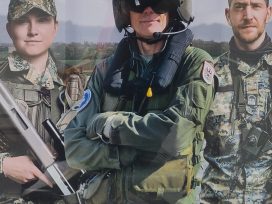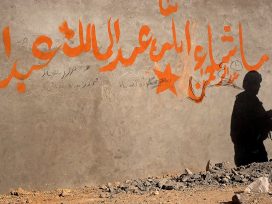While Ukrainian resistance shows no sign of abating, time plays in Putin’s favour. As for the West, it faces complex diplomatic choices. Clocks are ticking on all sides, but at different speeds.
Since February 24th, Ukraine has been at the forefront of global media and we have been inundated with both short and long-term predictions about the war as it progresses. It has led to endless analysis, some profound, some superficial, some objective, some ideological, some partisan and much contradictory.
We all want to know how this tragic conflict will end, whether Ukraine prevails and remains free or Vladimir Putin’s Russia conquers its neighbour.
What would either development mean for the future of the West? What would be the status of the external and internal enemies of liberal democracy that have grown during the last decade and have been somewhat muted since February?
While war continues, one thing is certain: this is a ‘totally new era’. Henry Kissinger defined the period after February 24th in this way as one cannot predict the outcome of the war and its global ramifications. To complicate the matter, it seems as if different forces in the conflict operate according to different timeframes and hence require a different prism to understand.
This piece will look at the many key unseen developments unleashed by Putin’s aggression. Furthermore, it will review the areas – the status of Saudi Arabia, China and the future of offshore tax havens – that might influence future developments in international relations and determine the fate of Russia. But first, it is important to discuss a bit of central European history in order to assess the current conflict.
Euphemisms of 1968 and 2022
To many Slovaks and Czechs, Russia’s aggression towards Ukraine was a reminder of a similar act of aggression by the Soviet Union in 1968. Both events were unexpected and shocking, although in both cases the United States was aware beforehand of what was coming. Whilst diplomatic channels revealed the USSR’s intentions, Putin’s plans were revealed thanks to the work of US intelligence agencies.
In both cases, no one offered direct help to the countries facing the aggressor. The nuclear deterrent worked in Moscow’s favour in 1968 and holds NATO back in 2022, although the West has responded with a massive amount of help in the form of military equipment and economic assistance.
The worst part of the invasion of Czechoslovakia was not the direct military occupation. In fact, the nation remained united and stood behind then-leader Alexander Dubček and his government, who were kidnapped and taken to somewhere in Russia on the night of the invasion.
The puppet government planned by Moscow did not take over in August 1968 and Dubček’s legitimate government was allowed to return, albeit just for a few months until Moscow found its quisling figure, Gustav Husák. In consort, they unleashed the so-called ‘normalization’ – the most humiliating two decades of Czechoslovakia’s history. Almost a million Slovaks and Czechs emigrated and those who remained and wanted to keep their professional positions had to sign a shameful declaration that they ‘agree with the brotherly help of the Warsaw Pact Treaty Organisation in August 1968’. That ‘brotherly help’ was as much a euphemism for Soviet aggression as the ‘special military operation’ is for the Russian war and aggression in Ukraine today.
The ‘normalisation period’ (1969-89) broke the spirit of the nation. People withdrew into internal exile and hopelessness. This was combined with a cultural and intellectual bleakness that, everyone believed, would last for generations. No one, not even the communist leaders, believed in communist propaganda. It was just a puppet regime led by puppet henchmen on the outskirts of the Soviet imperium.
Why this comparison from a different era? Overall, it is clear that Ukraine is fighting not only for its land and political system but also for the survival of human dignity that, if victorious, Russia would undoubtedly try to obliterate – a brutal but ultimately futile endeavour. In fact, it is already doing this in those areas under its occupation, with some Ukrainians even being deported to Russia.
A successful Russian occupation would mean the physical destruction of cities and the expulsion of much of the population, just as the occupants are already doing in Mariupol and eastern Ukraine. Putin, a former KGB officer in East Germany, knows by now not only that Russian soldiers are unwelcome but that the Ukrainian spirit and dignity must be subdued, and those unrepentant expelled or killed. The lesson from Czechoslovakia after 1968 is that the aftermath of Soviet/Russian aggression is worse than the defeat itself.
Unsynchronized clocks
The outcome of the war will be determined by three key actors – Ukraine, Russia and the West. However, all three operate as if they are in different time dimensions. One of the features of the ‘totally new era’ is that clocks are ticking on all sides, but the speed seems different. For Ukraine, fighting for survival every hour and every day is crucial and fateful.
The government has to attend to the immediate needs of the military and civilian population, unaware of where the next Russian missile will hit. President Volodymyr Zelensky, the prime target of Russia’s henchmen from day one, lives every minute on borrowed time. Hence, the next shipment of arms or economic aid dominates the country’s priorities and discourse with the outside world.
Zelensky’s desperate appeals and pleading reflect his country’s daily troubles and, at the moment, discount any long-term consequences and future settlements. That is why Kissinger’s long-term strategic proposition that Ukraine cede territory to Russia seems so absurd and outrageous to Kyiv. The government needs a morale boost for its population to fight and survive the next day.
The clock for the West ticks in weeks and months, reflecting the price of oil and gas, as well as a looming economic crisis, general wariness and the media’s natural attention span. Despite the unprecedented unity of its key political actors, politicians are aware that there is a limit to how long the West can focus on Ukraine, especially if the economic crisis deepens and Kyiv starts losing on the battlefield.
The threat of nuclear escalation, though illogical and unlikely, cannot be discounted because the perception of the threat among western populations is real and ominous. Putin’s decision to put Russia’s nuclear arsenal on high alert, combined with the hysterical diatribe of Russia’s media demanding the use of nuclear weapons, only heightens the western public’s uncertainty. One notable example of this trend can be found in Germany, whose current leader Olaf Scholz has proven unreliable regarding military help for Ukraine. The chancellor continues to act cautiously lest Russia take revenge against the West.
Ukraine and the West, whose clocks seem to tick faster, face a Russia where the clock ticks in long spans, in years or even the lifetime of the dictator. Putin can use force to suppress the population and faces no hostile opposition or critical media. Thus, the initial military failure to take over all of Ukraine or even the capital Kyiv has not affected his position.
Yet the history of tyrannies shows that there is no guaranteed security for a despot. The Russian president’s prospects imply a life in power but, in times of crisis, as Xenophon reminds us, any moment can be fatal. Putin’s regime can keep suppressing Russia’s population and opposition, but there is a limit. This kind of society simmers underneath and might boil over if the misery becomes worse than fear. There is a long tradition of rebellions and revolutions in Russia’s chequered history and these were directed at many rulers who acted ruthlessly towards the population and any political opposition.
In addition, although there is no opposition in Russia today, there is a modern ‘praetorian guard’ consisting of the army, secret police and oligarchs who assess their prospects carefully every day during this uncertain war. Paradoxically, with no democratic politician to replace Putin, his potential replacement by someone from that group would be worse than facing a strong Putin today. The current Russian leader seems resolute and somewhat unpredictable, but in command. The praetorian guard in charge would be fierce, dangerously unpredictable and prone to fighting with one another. A threat to Russia and the rest of the world.
Many uncertain variables must be tackled before the clocks of the three will synchronize. Russia’s advantage is relative and related to Ukraine’s resolve and the West’s unity. Still, the West and eventually Ukraine will have to find a way to negotiate with Putin. This will not happen, however, before either the battlefield decides or the pressure against Russia forces it to the table.
The ‘totally new era’
It is useful to briefly review the key aspects of Kissinger’s ‘totally new era’. First, Ukraine’s resistance has been unexpected, strong and heroic. The circumstances also generated a great leader. A comedian who became the president and whose popularity prior to the invasion was plummeting became a statesman. He acted as a true leader, not fearing for his life but for the existence of his nation. Ukraine rallied behind Zelensky and this has truly become his ‘finest hour’. One can assume that if Ukraine was defeated shortly after February 24th, developments in the West would be quite different.

Independence Monument, Maidan Nezalezhnosti, Kiev. Photo by Adam Jones via Wikimedia Commons.
However, thanks to Ukraine’s resistance, the European Union and NATO stood united behind the victim. The country’s bravery also strengthened internal cooperation among EU members and improved NATO’s resolve and legitimacy. Help from these two western alliances has denied Putin military and strategic success.
Another development can be seen regarding transatlantic cooperation, with US President Joe Biden pursuing a more constructive policy towards the EU and NATO than his predecessor. NATO is now ready to fulfil Article 5 of its charter, which outlines how all members must come to the military assistance of any member attacked by an external aggressor. The Baltic states and many post-communist countries value their membership in NATO now more than ever.
Finally, although the resistance of Ukraine has been admirable, the porous strategy and capabilities of the Russian army have also been surprising. The Russian Federation’s intelligence community did not provide valid information about Ukraine’s military capabilities or the mood of the population. Subsequently, Putin dismissed the whole department that provided unreliable information. This is a common story in the history of dictatorships, where even the intelligence services are afraid to provide a fair assessment to the dictator for fear of being punished.
In addition, the morale of the Russian army seems low and its young recruits are naturally reluctant to fight. Contrary to what Putin claimed prior to the invasion, they neither faced Ukrainian Nazis nor were killed by biological weapons. And there was no cheerful welcome even from the Russian-speaking population. Instead, they faced the misery and cries of civilians and the feisty resistance of the Ukrainian army.
Hence, after several failures, Putin’s strategy has focused on fierce artillery shelling and long-distance missile attacks, rather than continuous and direct combat. Although the size of the Russian army is much bigger than Ukraine’s, there will be a limit on how many long-range missiles Russia can deliver and produce due to western sanctions.
Diplomatic chess game
The role of China, Saudi Arabia and the status of global tax havens are three issues that might have a great impact on the outcome of the conflict. The West is instrumental in all three of these areas. It must do its utmost to prevent close cooperation between Russia and China. This is a delicate diplomatic chess game that experts analyse and design and politicians execute. It will be a complex and complicated process because Xi Jinping’s mighty China does not bow easily to pressure. Yet without cooperation with Beijing – especially with respect to the production of electronic components that Russia does not produce – the sanctions will not be effective.
One key factor that will determine the unity of the western countries is the price of crude oil on the world markets. And the key actor for that here is Saudi Arabia, which can immediately increase the supply and thus decrease the price of crude oil. The problem is that Mohammed bin Salman, better known as MBS, is now a pariah in the West after he ordered the murder of exiled Saudi journalist Jamal Khashoggi. MBS conditions any increased supply with once again being internationally recognized and accepted. The West is naturally reluctant to undergo such a cynical diplomatic trade.
However, political philosopher Fareed Zakaria, who was a personal friend of the deceased journalist, recommends that the West consider such a deal with MBS in order to lower the price of oil and keep the current anti-Russian front united.
It is a complicated diplomatic move and requires the West to sacrifice some of its high moral ground in order to prevail over Russia and, eventually, save Ukraine. And that is difficult for any democratic politician under pressure from public opinion, opposition and a free press. But as Zakaria argues, Nixon and Kissinger visiting, cooperating with and recognising Mao’s China in the early 1970s solved a dilemma similar to what is now faced by western leaders regarding MBS. In the long term, Nixon in China was a decisive move that, among other things, eventually forced the Soviets to the negotiation table regarding nuclear disarmament.
War on tax havens?
Another strategy that would impact Russia’s fate and also curb global corruption is preventing dictators, oligarchs and financial speculators from hiding their ill-begotten fortunes in the many tax havens around the globe. This is a long overdue move, regularly discussed when investigative journalists from major western dailies work together and publish the lists of secret bank accounts, as was the case, for example, with the ‘Panama Papers’.
Tax havens are a global problem and the West, being fully involved, is reluctant to act. Yet, in the long term, it is a crucial strategy in the fight to curb ubiquitous global corruption – the key drain on the global economy. As long as these mostly illegal offshore bank accounts exist, Russian oligarchs will continue to stash their loot there. Seizing a few yachts makes for good headlines but is insignificant in fighting Russia’s status quo. It is a regime based on loyalty and the corruption of a few, draining Russia’s economy and resources, taking money abroad.
The Russian oligarchs know that once the embargo and sanctions end, their stolen money awaits them, among others, in Austria, Luxembourg, Malta, Delaware, the Cayman Islands or Panama.
Ending tax havens would help the West and eventually democracy in Russia and would restrict many dictatorships around the globe, that drain their countries of precious financial resources. It seems like a long-term and seemingly insurmountable problem. In a way, it is similar to the climate crisis. It also requires a united global strategy and strong determination. Actually, the closing of tax havens is technically much simpler if western governments decide to act in unison.
With Ukraine and Putin’s aggression looming over the West, there is a window of opportunity to tackle this decisive problem. This opportunity should not be missed. Tax havens drain democratic regimes, undermine the rule of law, encourage corruption and sustain human and drug trafficking. They allow all the dictators and criminals of the world to steal indiscriminately and hide their loot with impunity. It would not solve all the issues of this world but it would be a decisive step towards strengthening democracies while facing global poverty and even environmental crisis.
As mentioned at the outset of this text, the outcome of the conflict between Russia and Ukraine is unknown. Ukraine defends itself with a level of bravery not many expected. The West also underwent spectacular development by uniting and assisting Kyiv. For Putin, his regime is at stake in Ukraine and he will not give up easily. If Russia wins, the bleak consequences are clear. On the contrary, if Ukraine defends itself against aggression, it will secure its own survival and strengthen the West. Before Kissinger’s ‘totally new era’, it would have been hardly conceivable but, at this moment of war, any strategy leading to Ukraine’s freedom should shape the West’s resolve, actions and goals.
Published 24 August 2022
Original in English
First published by New Eastern Europe 4/2022
Contributed by New Eastern Europe © Samuel Abrahám / New Eastern Europe / Eurozine
PDF/PRINTPublished in
In collaboration with
In focal points
Newsletter
Subscribe to know what’s worth thinking about.
Related Articles

For those who suffered the consequences of Yalta’s division of Europe, the Helsinki Final Act brought grounds for optimism. Today, as Russia’s regressive war on Ukraine reopens old conflicts, it stands as a monument to European modernity.

Artist Marharyta Polovinko’s creativity persisted in a tormented form through her experiences as a soldier on the Ukrainian frontline. The words of a recently called-up fellow creative and young family man provide a stark reminder that the Ukrainian military is buying Europeans time.






